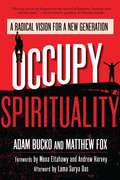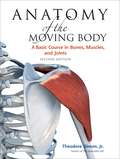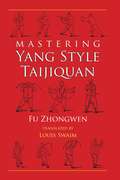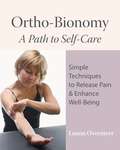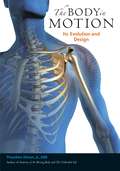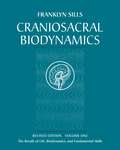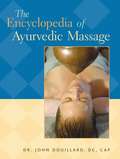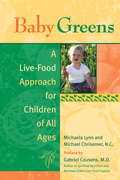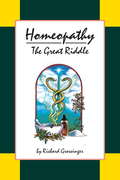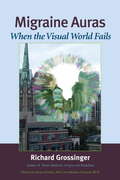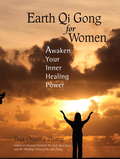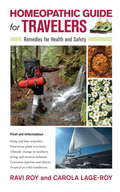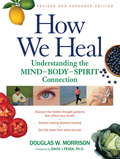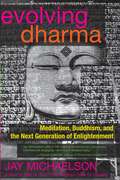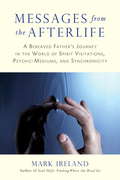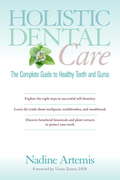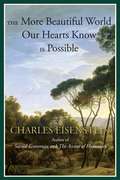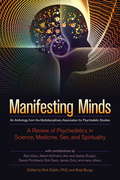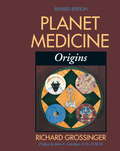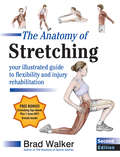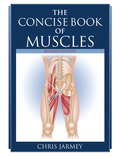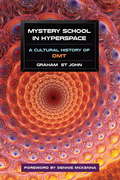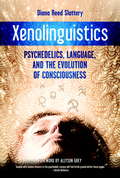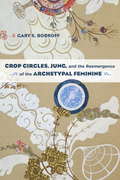- Table View
- List View
Occupy Spirituality: A Radical Vision for a New Generation (Sacred Activism #1)
by Matthew Fox Andrew Harvey Lama Surya Das Adam Bucko Mona EltahawyThe Occupy Wall Street movement and protest movements around the world are evidence of a new era of intergenerational activists seeking deeper spiritual meaning in their quest for peace and justice.This book is a call to action for a new era of spirituality-infused activism. Authors Adam Bucko and Matthew Fox encourage us to use our talents in service of compassion and justice and to move beyond our broken systems--economic, political, educational, and religious--discovering a spirituality that not only helps us to get along, but also encourages us to reevaluate our traditions, transforming them and in the process building a more sacred and just world.Incorporating the words of young activist leaders culled from interviews and surveys, the book provides a framework that is deliberately interfaith and speaks to our profound yearning for a life with spiritual purpose and for a better world. Each chapter is construed as a dialogue between Fox, a 72-year-old theologian, and Bucko, a 37-year-old spiritual activist and mentor to homeless youth. As we listen in on these familiar yet profound conversations, we learn about Fox and Bucko's own spiritual journeys and discover a radical spirituality that is inclusive, democratic, and relevant to the world we live in today.Table of ContentsForeword by Mona EltahawyForeword by Andrew HarveyIntroduction: Invitation to Occupy Your Conscience1. Is It Time to Replace the God of Religion with the God of Life?2. Radical Spirituality for a Radical Generation3. Adam's Story4. Matthew's Story5. What's Your Calling? Are You Living in Service of Compassion and Justice?6. Spiritual Practice: Touch Life and Be Changed by It 7. No Generation Has All the Answers: Elders and Youth Working Together8. Birthing New Economics, New Communities, and New Monasticism Conclusion: Occupy Generation and the Practice of Spiritual Democracy Afterword by Lama Surya DasFrom the Trade Paperback edition.
Anatomy of the Moving Body, Second Edition: A Basic Course in Bones, Muscles, and Joints
by Theodore Dimon John QualterLearning anatomy requires more than pictures and labels; it requires a way "into" the subject, a means of making sense of what is being shown. Anatomy of the Moving Body addresses that need with a simple yet complete study of the body's complex system of bones, muscles, and joints and how they function. Beautifully illustrated with more than 100 3D images, the book contains 31 lectures that guide readers through this challenging interior landscape. Each part of the body is explained in brief, manageable sections, with components described singly or in small groups. The author doesn't just name the muscles and bones but explains the terminology in lay language. Topics include the etymology of anatomical terms; origins and attachments of muscles and their related actions; discussion of major functional systems such as the pelvis, ankle, shoulder girdle, and hand; major landmarks and human topography; and structures relating to breathing and vocalization. This second edition features all-new illustrations that use a 3D digital model of the human anatomical form. The book's thoroughness, visual interest, and clear style make it ideal for students and teachers of the Alexander and Feldenkrais techniques as well as for practitioners of yoga, Pilates, martial arts, and dance.
Mastering Yang Style Taijiquan
by Louis Swaim Fu ZhongwenFu Zhongwen's classic guide offers the best documentation available of the Yang style of taijiquan. The superbly detailed form instructions and historic line art drawings are based on Fu's many years as a disciple of Yang Chengfu, taijiquan's legendary founder. Also included are concise descriptions of fixed-step, moving-step, and da lu push hands practices. Additional commentary by translator Louis Swaim provides key insight into the text's philosophical language and imagery, further elucidating the art's cultural and historical foundations.
Ortho-Bionomy: A Path to Self-Care
by Denise Deig Luann OvermyerOrtho-Bionomy is based on the premise that the body inherently knows how to heal and self-correct, given the opportunity. This user-friendly self-help guide by one of the pioneers of the approach presents positions, postures, and movements designed to release tension and ease pain. Not only are the techniques simple to perform, but they can be done on one's own, without the use of special equipment. Positions for each part of the body are clearly described in lay terms and illustrated with photos and drawings. Selected topics include low back, hip and knee pain, neck, shoulder, and rib releases, repetitive strain injuries, and arthritic pain in the hands. Quick fixes for sciatica, suggestions for dealing with menstrual cramps, and gentle movement exercises to address posture, scoliosis, and flexibility of the spine are just a few among 150 techniques described. The book also includes simple movements and exercises to increase ease, function, strength, and flexibility once the pain has subsided. Rounded out with human-interest stories and client examples, this accessible work can be used quickly and effectively by anyonewith pain.
The Body in Motion: Its Evolution and Design
by Dimon Theodore G. David BrownIn The Body in Motion, author Theodore Dimon confronts a simple yet crucial task: to make sense of our amazing design. This comprehensive guide demonstrates the functions and evolution of specific body systems, explaining how they cooperate to form an upright, intelligent, tool-making marvel, capable of great technological and artistic achievement. Enhanced with 162 beautifully rendered full-color illustrations, the book opens with an introduction to the origins of movement, leading the reader on a journey through time and evolution--from fish to amphibian, quadruped to primate--showing how humans became the preeminent moving beings on the planet.Delving deeper into our upright support system, The Body in Motion clearly describes the workings of the hands and upper limbs; the pelvic girdle; the feet and lower limbs; breathing; the larynx and throat musculature; and more. Central to the book is the idea that it is our upright posture that makes it possible for us to move in an infinite variety of ways, to manipulate objects, to form speech, and to perform the complex rotational movements that underlie many of our most sophisticated skills. These systems, Dimon argues persuasively, have helped us build, invent, create art, explore the world, and imbue life with a contemplative, spiritual dimension that would otherwise not exist.
Craniosacral Biodynamics, Volume One
by Franklyn Sills Dominique DegrangesCraniosacral therapy is based on the belief that functions of the human system are maintained and integrated by a biodynamic force known as 'primary respiration,' or the breath of life. Found in the brain, spinal cord, and bodily fluids, this rhythmic pulse promotes healing and health. Written for students and practitioners but accessible to lay readers, this text presents the fundamental concepts and techniques of a method that redirects the cerebrospinal fluid to areas of imbalance, thus enhancing overall health. Volume One covers both the history and conceptual ideas fundamental to Craniosacral Biodynamics, as well as the more complex structural and tissue relationships.
The Encyclopedia of Ayurvedic Massage
by John DouillardFive thousand years old, Ayurvedic massage has been shown to still the mind and body by lowering metabolic rates and inspiring feelings of peace and calm. Often administered as a part of a three-, five-, or seven-day program, these treatments are an integral part of deep cleansing, rejuvenation, and life-extension Ayurvedic programs called panchakarma or kya kalpa. This book by a noted practitioner features more than 15 of these treatments, each described in step-by-step detail and some synchronized with two therapists for up to two hours in length. It provides the reader with all the tools necessary to begin Ayurvedic treatments as a part of a spa menu or massage therapy program.
Baby Greens
by Gabriel Cousens Michaela Lynn Michael ChrisemerThe typical American diet is a major factor in the epidemic of obesity and poor health in the country's children. Baby Greens helps parents establish healthy eating habits in their children--and themselves--through a diet rich in raw foods. A lively mix of education, philosophy, recipes, and activities, the book adapts the living foods approach for all ages and lifestyles. The first part of the book explains the principles of bioenergetic nutrition and shows how cutting-edge nutritional practices--including nutritional individuality, pH balance, terrain testing, and homeopathy--can dramatically improve a child's health. In addition to recipes and resources, the second part offers insights into the holistic approach to pregnancy, breastfeeding, extended breastfeeding, weaning, food experimentation, play, and other daily activities. Written in reassuring, easy to understand language, Baby Greens empowers parents to step outside the fast food box and take a proactive approach to maintaining their family's health and well-being.
The Nine Eyes of Light
by Padma Aon PrakashaThe Nine Eyes of Light is an exploration into multidimensional being. This is the light-body guidebook for the spiritual traveler. The Nine Eyes, also known as Ascension Keys, are the nine levels of consciousness that served as the foundation for Egypt's awakened civilization. Deeply relevant for navigating our tumultuous times today, these multidimensional perspectives, or lightbodies, reveal how to further understand and develop our consciousness. In practice, many of us are using some of these bodies already, but not all of them, because we have lost sight of our higher potential.These other bodies, says Prakasha, allow us to sense, navigate, and unify all parts of our human and divine selves. The book shows readers how to experience the universal bodies of light; how to access hidden wisdom about Anubis, a pre-Christ figure and original Sphinx; and how to open and purify the heart through the 42 Laws of Harmony, or Ma'at. Chapters include teachings on the science of vibration, sound, and perception; willpower, bliss, and the fuel for love; god consciousness; the shadow as a gateway to source, and much more. The Nine Eyes unite the mind, body, and spirit in loving wisdom and power.
Homeopathy: The Great Riddle
by Richard Grossinger Dana UllmanThis is a wonderfully succinct book which sets forth the history, essence, and methodology of homeopathy. The book is well organized in 5 major sections. There is a very thorough overview of the precepts and tenets of the practice, its historical origins, a detailed and well-covered biography of Samuel Hahnemann and a review of the politics of the allopathy v. homeopathy debate. It is further embellished with copious annotations, an appendix with an actual case history and a very fine reference for homeopathic resources such as organizations, suppliers and other texts covering a variety of related topics. Call it a perfect Homeopathy 101 text if you will, the author makes a very even-handed presentation of the material, including the politics of medicine as they have evolved in the USA over the past century.
Migraine Auras
by Richard Grossinger Markus Dahlem Klaus PodollMigraine headaches are familiar and generally treatable ailments. Less understood are migraine auras or scotoma, visual distortions--sometimes accompanied by headache and sometimes not--that make it difficult, sometimes impossible, to see clearly. Migraine auras can be frightening, disorienting, even incapacitating. Richard Grossinger, who has suffered from them himself, here presents a helpful guide to the subject that maps the terrain, describes the various forms migraine auras can take, charts his personal experiences with them, and offers informed suggestions for homeopathic and other treatments.
Earth Qi Gong for Women
by Earl Morgan Chen Xiu Qin Tina Chunna Zhang Michael MilburnThe special medical Qi Gong described in this book was developed and perfected over the course of 1,700 years by Taoists, traditional Chinese medical doctors, and Qi Gong experts in China to meet the needs of a woman's unique anatomy. Author Tina Zhang leads readers through a variety of pleasurable postures and easy exercises that address specific areas of the body. In turn, these exercises, which work progressively to strengthen the spirit-mind-body connection, enhance natural female energy to help prevent or alleviate health issues and conditions from puberty to post-menopause, including high blood pressure, stress, fatigue, endometriosis, age-related problems, and more. Emphasizing a balance between hormones and emotions, the book includes concise descriptions of selected acupuncture points, meridians, and orbits that promote long-range anti-aging and long-term optimal health. Women empowered by these benefits can take control of their bodies and better direct and assist their physicians in maintaining their health without the cost, risk, and side effects of pills, hormones, and supplements. Qi Gong for Women also contains useful information on addressing women's physical and spiritual health for physicians, acupuncturists, and doctors of Traditional Chinese Medicine (TCM).
Homeopathic Guide for Travelers
by Ravi Roy Carola Lage-RoyRavi Roy and Carola Lage-Roy present a wealth of strategies for using homeopathic medicine to stay happy and healthy while traveling. A bestseller in its original German edition, The Homeopathic Guide for Travelers is equally useful for backpackers, business travelers, and even luxury vacationers. It provides all the preparation needed for a journey, whether a short outing, far-off holiday, or challenging trek.The homeopathic remedies profiled here--many of them effective even when taken last-minute--address everything from exhaustion to altitude change, from jet lag to climate shifts to the side effects of unfamiliar foods. Drawing from the latest research, the book describes which homeopathic medicines work best against infectious diseases, such as malaria, hepatitis, and Lyme disease, and details remedies for injuries sustained while backpacking, climbing, or diving. Roy and Lage-Roy also explain how to treat stings and bites from poisonous animals and reactions from plants like poison ivy. An introductory chapter features a basic traveler's first-aid kit.
How We Heal, Revised and Expanded Edition
by Douglas W. Morrison David PesekUnlike health books that cover only nutrition and lifestyle factors, or books that deal with consciousness, spirituality, personal growth, and metaphysical considerations outside the realm of the physical, How We Heal addresses healing in the broadest conceivable context. It presents this whole range of topics in a coherent, comprehensive manner that introduces the novice reader to Body Electronics, iridology, sclerology, and other alternative health modalities. Author Douglas Morrison explores the physical factors -- sleep, water, exercise, and detrimental influences such as amalgam dental fillings, root canals, fluoride, electromagnetic fields, vaccinations, drugs -- that influence health and explains why it's necessary to integrate them with the hidden patterns of thought, word, and emotion that make healing possible. Through the use of analogies and practical examples, the book helps readers embrace this new way of seeing their own reality. Diagrams and illustrations throughout help further illuminate these potentially life-changing concepts.
Evolving Dharma: Meditation, Buddhism, and the Next Generation of Enlightenment
by Jay MichaelsonEvolving Dharma is the definitive guide to the meditation revolution. Fearless, unorthodox, and irreverent scholar and activist Jay Michaelson shows how meditation and mindfulness have moved from ashrams and self-help groups to classrooms and hospitals, and offers unusually straight talk about the "Big E"-- enlightenment. Michaelson introduces us to maverick brainhackers, postmodern Buddhist monks, and cutting-edge neuroscientists and shares his own stories of months-long silent retreats, powerful mystical experiences, and many pitfalls along the way. Evolving Dharma is a must-read for the next-generation meditator, the spiritually cynical, and the curious adventurer in all of us.From the Trade Paperback edition.ct the practice of meditation and the path to upgrading the mind. Michaelson is fearless, unorthodox, and irreverent, yet his book is also based on his decade of meditation practice and teaching as well as his ten years of work as an LGBT activist. Including forays into neuroscience and cultural criticism as well as the author's personal stories of his five months spent in silent retreat, life-changing realizations, pain, joy, and insight, this engaging, honest, and often humorous book is a must-read for younger practitioners in any Buddhist or secular tradition, as well as novice or experienced meditators interested in learning about how meditation has evolved in the last several decades.Chapter titles include "The Dharma Evolves By Disappearing," "The Evolution of Enlightenment," and "When Every Mystical State You've Ever Wanted Isn't Enough."From the Trade Paperback edition.
Messages from the Afterlife
by Mark IrelandA father watches his teenage son step out the door on a hiking trip, not knowing that this is the last time he would see him.... A journal of grief, despair, and ultimately, hope, this book tells the story of every parent's nightmare--the sudden death of a child--and a father's search for meaning in a seemingly random world of psychics and skeptics. Expanding on territory covered in his 2008 memoir of his son's death Soul Shift, Messages from the Afterlife is both an account of Ireland's journey from indifference to belief and an overview of the resources available to the bereaved to help them receive messages from the afterlife. Mark Ireland, son of celebrated "psychic to the stars" Dr. Richard Ireland, was a successful marketing executive in Arizona with little interest in his father's colorful history. While his father held readings for Mae West and traveled the U.S. demonstrating his parapsychological powers, Mark Ireland took a more conventional route through life. But when his own teenage son Brandon suddenly dies while hiking in the mountains with friends, Ireland is forced to confront his resistance to all things spiritual and begins to explore the possibility that communication with the dead is real. In his search for conclusive evidence of life after death, he plunges into his father's world and meets an array of respected psychic-mediums who deliver unexpected messages not only from his son in the afterlife but also from many other souls seeking to communicate with the living. Fighting to retain a sense of critical thinking, Ireland also contacts scientists conducting research into the survival of consciousness after death. The book features detailed accounts of tests and experiments that various people have conducted to obtain proof of consciousness survival, including Ireland's own, involving a secret message left behind by his sister, Robin, who died of pancreatic cancer. The contents of this message were unknown to any living person and remained sealed in an envelope--untouched--until responses had been received from a group of qualified mediums who sought to "crack" the code. Messages from the Afterlife shows how spirit communication can be both undeniably accurate and frustratingly ambiguous, and above all demonstrates the value of having an open, receptive mind while maintaining faith in the indestructiblity of the human spirit.From the Trade Paperback edition.
Holistic Dental Care: The Complete Guide to Healthy Teeth and Gums
by Nadine Artemis Victor ZeinesA comprehensive guide to natural, do-it-yourself oral care, Holistic Dental Care introduces simple, at-home dental procedures that anyone can do. Highlighted with fifty-three full-color photos and illustrations, this book offers dental self-care strategies and practices that get to the core of the problems in our mouths--preventing issues from taking root and gently restoring dental health. Based on a "whole body approach" to oral care, Holistic Dental Care addresses the limits of the traditional approach that treats only the symptoms and not the source of body imbalances. Taking readers on a tour of the ecology of the mouth, dental health expert and author Nadine Artemis describes the physiology of the teeth and the sources of bacteria and decay. Revealing the truth about the artificial chemicals in many toothpastes and mouthwashes, Artemis also discusses the harmful effects of mercury fillings and the much safer ceramic filling options that are available. Covering topics that include healthy nutrition, oral care for children, and the benefits of botanical substances and plant extracts for maintaining oral health, Artemis introduces a comprehensive eight-step self-dentistry protocol that offers an effective way to prevent decay, illness, acidic saliva, plaque build-up, gum bleeding, inflammation, and more.
The More Beautiful World Our Hearts Know Is Possible
by Charles EisensteinIn a time of social and ecological crisis, what can we as individuals do to make the world a better place? This inspirational and thought-provoking book serves as an empowering antidote to the cynicism, frustration, paralysis, and overwhelm so many of us are feeling, replacing it with a grounding reminder of what's true: we are all connected, and our small, personal choices bear unsuspected transformational power. By fully embracing and practicing this principle of interconnectedness--called interbeing--we become more effective agents of change and have a stronger positive influence on the world.Throughout the book, Eisenstein relates real-life stories showing how small, individual acts of courage, kindness, and self-trust can change our culture's guiding narrative of separation, which, he shows, has generated the present planetary crisis. He brings to conscious awareness a deep wisdom we all innately know: until we get our selves in order, any action we take--no matter how good our intentions--will ultimately be wrongheaded and wronghearted. Above all, Eisenstein invites us to embrace a radically different understanding of cause and effect, sounding a clarion call to surrender our old worldview of separation, so that we can finally create the more beautiful world our hearts know is possible.With chapters covering separation, interbeing, despair, hope, pain, pleasure, consciousness, and many more, the book invites us to let the old Story of Separation fall away so that we can stand firmly in a Story of Interbeing.From the Trade Paperback edition.
Manifesting Minds
by Rick Doblin Brad BurgeFeaturing essays and interviews with Timothy Leary, Aldous Huxley, Ram Dass, Albert Hofmann, Alexander (Sasha) Shulgin, Daniel Pinchbeck, Tim Robbins, Arne Naess, and electronic musician Simon Posford, as well as groundbreaking research and personal accounts, this one-of-a-kind anthology is a "best of" collection of articles and essays published by the Multidisciplinary Association for Psychedelic Studies (MAPS). Topics include the healing use of marijuana and psychedelics--including MDMA, ibogaine, LSD, and ayahuasca--for PTSD, anxiety, depression, and drug addiction, as well as positive effects of these substances in the realm of the arts, family, spirituality, ecology, and technology. Among many other thought-provoking and mind-opening pieces are the following:* "On Leary and Drugs at the End," by Carol Rosen and Vicki Marshall * "Psychedelic Rites of Passage," by Ram Dass * "To Be Read at the Funeral," by Albert Hofmann * "Another Green World: Psychedelics and Ecology," by Daniel Pinchbeck * "Psychedelics and Species Connectedness," by Stanley Krippner, PhD * "Huxley on Drugs and Creativity," by Aldous Huxley* "Psychedelics and the Deep Ecology Movement: A Conversation with Arne Naess," by Mark A. Schroll, PhD, and David Rothenberg * "Psychedelic Sensibility," by Tom Robbins * "Electronic Music and Psychedelics: An Interview with Simon Posford of Shpongle," by David Jay Brown * "How Psychedelics Informed My Sex Life and Sex Work," by Annie Sprinkle* "Consideration of Ayahuasca for the Treatment of Posttraumatic Stress Disorder," by Jessica Nielson, PhD, and Julie Megler, MSN, NP-BC * "Psychedelics and Extreme Sports," by James Oroc * "Youth and Entheogens: A Modern Rite of Passage?," by Andrei Foldes with Amba, Eric Johnson, et al. * "Diary of an MDMA Subject," by Anonymous* "Dimethyltryptamine: Possible Endogenous Ligand of the Sigma-1 Receptor?," by Adam L. Halberstadt * "Lessons from Psychedelic Therapy," by Richard Yensen, PhD * "Psychosomatic Medicine, Psychoneuroimmunology, and Psychedelics," by Ana Maqueda * "Talking with Ann and Sasha Shulgin about the Existence of God and the Pleasures of Sex and Drugs," by Jon Hanna and Silvia ThyssenFrom the Trade Paperback edition.
Planet Medicine: Origins, Revised Edition
by John E. Upledger Richard GrossingerPlanet Medicine is a major work by an anthropologist who looks at medicine in a broad context. In this edition, additions to this classic text include a section on Reiki, a comparison of types of palpation used in healing, updates on craniosacral therapy, and a means of understanding how different alternative medicines actually work. Illustrated throughout, this is the standard on the history, philosophy, and anthropology of this subject.
The Anatomy of Stretching, Second Edition: Your Illustrated Guide to Flexibility and Injury Rehabilitation
by Brad WalkerThe multiple stresses of contemporary life--whether from excessive sports play, overwork, or overuse of technology--are increasingly taking a toll on the body. Symptoms range from muscle soreness and pain to pinched nerves to potentially more permanent disabilities, including serious body injuries. One safe, quickly productive way to address the problem is through a simple therapy that can be done anywhere, anytime, and without special equipment: stretching. This new edition of Brad Walker's best-selling book on the subject presents 135 unique stretching exercises designed to help repair the body and make it more flexible, fit, and relaxed. The book begins with clear, detailed descriptions of important principles of anatomy and physiology, the benefits of stretching, different forms of stretching, rules to remember, and how to stretch properly. It also focuses on the kinds of stretches that are most helpful in the alleviation or rehabilitation of specific sports injuries. Organized by body part, The Anatomy of Stretching presents stretching exercises in a uniform style accompanied by full-color anatomical illustrations. Equally useful for fitness fans, pro or amateur athletes, coaches and personal trainers, and healthcare practitioners, this new edition contains 20 new stretches; expanded physiology and anatomy information; and a revised numbering system that makes the stretches easier to reference. An expanded appendix includes a longer resources section and a helpful chart describing the top five stretches for each sport and sports injury.
The Concise Book of Muscles, Second Edition
by Chris JarmeyA clear, simple guide for students of anatomy as well as an excellent resource for athletes, massage therapists, and anyone interested in the workings of the human body, this user-friendly book is organized around six muscle groups. They include muscles of the face head, and neck; the trunk; the shoulder and upper arm; the forearm and hand; the hip and thigh; and the leg and foot. Each of the groups is given a distinctive color to make it easy to identify, and each muscle is shown in its relationship to the skeleton. Each gets a complete profile, including origin/insertion, action of the muscle, which nerve controls it, movements that use it, and exercises and stretches that strengthen it. The Concise Book of Muscles shows students exactly how to locate and identify specific muscles, highlighting those that are heavily used and therefore subject to injury in a variety of sports and activities. This expanded edition of a leading anatomy reference book includes 20 muscles not previously covered, adding greater depth to the original edition while remaining accessible and affordable.
Mystery School in Hyperspace: A Cultural History of DMT
by Graham St John Dennis MckennaSince the mid-1950s, the psychoactive compound DMT has attracted the attention of experimentalists and prohibitionists, scientists and artists, alchemists and hyperspace emissaries. While most known as a crucial component of the "jungle alchemy" that is ayahuasca, DMT is a unique story unto itself. Until now, this story has remained untold. Mystery School in Hyperspace is the first book to delve into the history of this substance, the discovery of its properties, and the impact it has had on poets, artists, and musicians. DMT has appeared at crucial junctures in countercultural history. William Burroughs was jacking the spice in Tangier at the turn of the 1960s. It was present at the meeting between Ken Kesey's Merry Pranksters and Tim Leary's associates. It guided the inception of the Grateful Dead in 1965. It showed up in Berkeley in the same year, falling into the hands of Terence McKenna, who would eventually become its champion in the post-rave neo-psychedelic movement of the 1990s. Its indole vapor drifted through Portugal's Boom Festival and has been evident at Nevada's Burning Man, where DMT has been adopted as spiritual technology supplying shape, color, and depth to a visionary art movement. The growing prevalence of use is evident in a vast networked independent research culture, and in its impact on fiction, film, music and metaphysics. As this book traces the effect of DMT's release into the cultural bloodstream, the results should be of great interest to contemporary readers. The book permits a broad reading audience to join ongoing debates in studies in consciousness and theology where the brain is held to be either a generator or a receiver of consciousness. The implications of the "spirit molecule" or "the brain's own psychedelic" among other theories illustrate that DMT may lift the lid on the Pandora's Box of consciousness. Features a foreword by Dennis McKenna, cover art by Beau Deeley, and thirty color illustrations by various artists, including Alex Grey, Android Jones, Martina Hoffmann, Luke Brown, Carey Thompson, Adam Scott Miller, Randal Roberts, along with Jay Bryan, Cyb, Orryelle Defenestrate-Bascule, Art Van D'lay, Stuart Griggs, Jay Lincoln, Gwyllm Llwydd, Shiptu Shaboo, Marianna Stelmach, and Mister Strange. Regarded as the "nightmare hallucinogen" or celebrated as the "spirit molecule," labelled "psychotogenic" or "entheogenic," considered a dangerous drug or the suspected X-factor in the evolution of consciousness, DMT is a powerful enigma. Documenting the scientists and artists drawn into its sphere of influence, navigating the liminal aesthetics of the "breakthrough" experience, tracing the novum of "hyperspace" in esoteric and science fiction currents, Mystery School in Hyperspace excavates the significance of this enigmatic phenomenon in the modern world. Exposing a great many myths, this cultural history reveals how DMT has had a beneficial influence on the lives of those belonging to a vast underground network whose reports and initiatives expose drug war propaganda and shine a light in the shadows. This conversation is highly relevant at a time when significant advances are being made to lift the moratorium on human research with psychedelics.From the Trade Paperback edition.
Xenolinguistics
by Diana Slattery Allyson GreyAre language and consciousness co-evolving? Can psychedelic experience cast light on this topic? In the Western world, we stand at the dawn of the psychedelic age with advances in neuroscience; a proliferation of new psychoactive substances, both legal and illegal; the anthropology of ayahuasca use; and new discoveries in ethnobotany. From scientific papers to the individual trip reports on the Vaults of Erowid and the life work of Terence McKenna, Alexander and Ann Shulgin, and Stanislav Grof, we are converging on new knowledge of the mind and how to shift its functioning for therapeutic, spiritual, problem-solving, artistic and/or recreational purposes. In our culture, pychonautics, the practices of individuals and small groups using techniques such as meditation, shamanic ritual, ecstatic dance and substances such as LSD and psilocybin for personal exploration, is a field of action and thought in its infancy. The use of psychonautic practice as a site of research and a method of knowledge production is central to this work, the first in-depth book focusing on psychedelics, consciousness, and language. Xenolinguistics documents the author's eleven-year adventure of psychonautic exploration and scholarly research; her original intent was to understand a symbolic language system, Glide, she acquired in an altered state of consciousness. What began as a deeply personal search, led to the discovery of others, dubbed xenolinguists, with their own unique linguistic objects and ideas about language from the psychedelic sphere. The search expanded, sifting through fields of knowledge such as anthropology and neurophenomenology to build maps and models to contextualize these experiences. The book presents a collection of these linguistic artifacts, from glossolalia to alien scripts, washed ashore like messages in bottles, signals from Psyche and the alien Others who populate her hyperdimensional landscapes. With an entire chapter dedicated to Terence and Dennis McKenna and sections dedicated to numerous other xenolinguists, this book will appeal to those interested in language/linguistics and the benefits of psychedelic self-exploration, and to readers of science fiction.
Crop Circles, Jung, and the Reemergence of the Archetypal Feminine
by Gary S. BobroffThrowing light on the mysterious phenomenon of crop circles within the context of modern psychological reality, Crop Circles, Jung, and the Reemergence of the Archetypal Feminine in an engaging look at the science, history, and symbolic nature of the mystery of these annually occurring giant-scale works of art. Gary S. Bobroff offers a framework for the reader's own deeper consideration of crop circles by examining both the phenomenon itself and the nature of the era into which it has arrived, with special consideration of its relevance to Jungian archetypal psychology.Living in the moment of the death of one worldview and the birth of another, our culture suffers from a hyper-masculine inflation that has us alienated, imagining ourselves to be separate from each other and the earth. Today we are presented with environmental, social, and spiritual crises and mysteries that call us back toward closer participation with the world. Crop Circles--formed in living grain--exemplify the archetypal feminine nature of this moment's change: a calling toward conscious, felt engagement with a dynamic, living, mysterious world. Placing this modern "dream" into the context of modern reality, Crop Circles, Jung, and the Reemergence of the Archetypal Feminine considers what it means to live in an era of strange encounters with energies larger than ourselves.ContentsCHAPTER ONE - BODY OF EVIDENCECHAPTER TWO - WITCHES' RINGS & DEVIL'S TWISTSCHAPTER THREE - GREENING CIRCLESCHAPTER FOUR - ANTIQUE PAGEANTRYCHAPTER FIVE - REASON ALONECHAPTER SIX - A CALLING BACK DOWNCHAPTER SEVEN - THE REALITY OF THE PSYCHECHAPTER EIGHT - GHOSTS OF ELECTRICITYCHAPTER NINE - NEVER MINDCHAPTER TEN - FIELDS OF WAVING CORNACKNOWLEDGMENTSSELECTED BIBLIOGRAPHYNOTES
